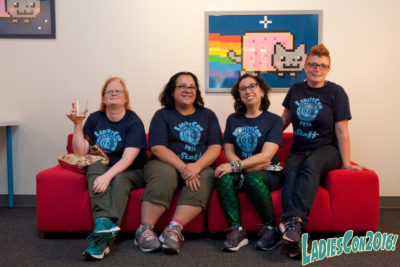
Human resources representatives and program directors by day, comic book critics by night: The Ladies of Comicazi devote most of their free time to consuming pop culture and promoting women who create.
The group’s current organizers are Erin McGrath, Elise Sacchetti, Valerie Sacchetti and Sarah Franks-Allen. McGrath explained that she and the Sacchetti sisters originally founded the group five years ago when the idea came to them at a friend’s party.
Their group’s name refers to the “Comicazi” comic book shop in Somerville, where the women would discuss comics together and were ultimately inspired to create a community where other women could join in and do the same.
“I think we all found our community at Comicazi,” Elise said. “That’s how we met each other, and we’d sit around and start talking about this stuff because it’s what we love.”
The group originally started with weekly blogs, and, in 2016, began to host an annual convention called “LadiesCon.”
According to The Ladies of Comicazi website, the convention is a free “one-day celebration of women of all kinds and their work in comic books, science fiction, fantasy, cosplay, and many other realms of pop culture.”
On Saturday, the organizers held the second “LadiesCon” at The Center for Arts at the Armory in Somerville. Each of the four women handled promotions, finding sponsors, coordinating with volunteers and putting together the nine panels for the event.
“Everybody said it was a wonderful experience and for us, that’s the measure of success,” McGrath said. “We sell a few things to make money but we’re not really concerned about our sales, we’re more concerned about the community being happy.”
Elise noted that the positive response was overwhelming and not entirely anticipated.
“At one point someone came up, and they were like, ‘Can I buy a Ladies of Comicazi T-Shirt?’ And we were like, ‘You’d buy that?’” she explained.
The ladies host other small events throughout the year as well, such as trivia nights, crafting events and an event called “View and Chew” where they provide a meal and play a television show with a common theme. The most recent event featured food from a burger truck and a viewing of “Bob’s Burgers.”
As a means of separating work life from personal life, each of the four women adapted cartoon character alter egos, such as “The Red Menace” and “Tiny Doom.” These alter egos serve as their biographies on the website, and include humorous descriptors such as “The One You Call When There Is a Bug in the House and champion Grammar Wrangler.”
“The ability to keep work and other life separate is sometimes really important,” McGrath explained. “But also [the descriptions] kind of give a snapshot of all of our personalities.”
Elise added that omitting some personal details about themselves on their website was partly because they knew that receiving negative comments was a possibility.
“We’ve been really lucky with getting positive responses within the internet community, but that’s not always the case with women on the internet,” she said.
The group’s main focus is ensuring that women and other groups who are marginalized in the entertainment world are given the chance to create and share their voice.
“We wanted to make a space where women were welcomed and accepted and as we thought about that we decided to expand it to anyone who identifies as a woman, anyone who is non-binary, queer folks, people of color, because they all exist. They’re making things,” McGrath said.
She added that they wanted to make sure not to exclude cis, straight white men, but instead to shift the emphasis to other creators who are typically less represented in pop culture.
Barbara Gottfried, an instructor and co-director of undergraduate studies in the women’s, gender and sexuality studies program at Boston University, teaches various classes that dive into how women’s work in pop culture is perceived in society.
The example she gives in her “Women, Race, and Gender in Media” class is that WGBH, a public radio station, once mentioned five times in an hour and a half that it was opening night for the New England Patriots.
“I can think of almost nothing that directly addresses women in pop culture that would have been mentioned five times in an hour and a half on national public radio,” Gottfried explained. “So if men do it or care about it, it’s important, and if women do it it’s trivialized.”
Gottfried noted that masculinity has always been perceived as an “active, contesting place” while women have historically been perceived as being more passive, and solely the object of the male gaze.
“In order to have a culture in which women are active, you have to rethink everything about women,” she said. “It’s a tall order, but I think it’s happening.”















































































































